Iphigénie en Tauride is a 1779 opera by Christoph Willibald Gluck in four acts. It was his fifth opera for the French stage. The libretto was written by Nicolas-François Guillard.
Armide is an opera by Christoph Willibald Gluck, set to a libretto by Philippe Quinault. Gluck's fifth production for the Parisian stage and the composer's own favourite among his works, it was first performed on 23 September 1777 by the Académie Royale de Musique in the second Salle du Palais-Royal in Paris.
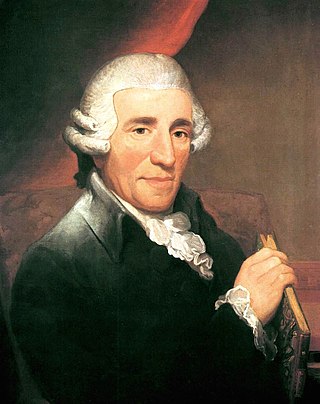
La canterina, Hob. XXVIII/2, is a short, two-act opera buffa by Joseph Haydn, the first one he wrote for Prince Esterhazy. Based on the intermezzo from the third act of Niccolò Piccinni's opera L'Origille (1760), it lasts about 50 minutes. It was written in 1766, and was premiered in the fall of that year.

Teseo is an opera seria with music by George Frideric Handel, the only Handel opera that is in five acts. The Italian-language libretto was by Nicola Francesco Haym, after Philippe Quinault's Thésée. It was Handel's third London opera, intended to follow the success of Rinaldo after the unpopular Il pastor fido.
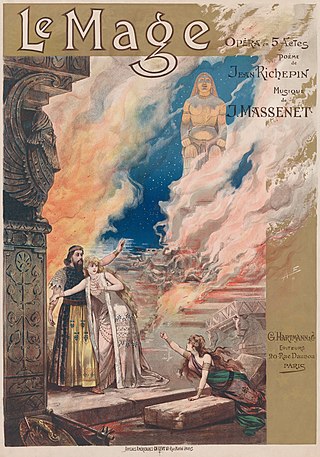
Le Mage is an opera in five acts by Jules Massenet to a French libretto by Jean Richepin. It was first performed at the Paris Opéra in Paris on 16 March 1891 in costumes by Charles Bianchini and sets by Auguste Alfred Rubé, Philippe Chaperon and Marcel Jambon, Amable and Eugène Gardy, Alfred Lemeunier, and Jean-Baptiste Lavastre and Eugène Carpezat.

Amadis is an opera in three acts with prologue by Jules Massenet to a French libretto by Jules Claretie based on the Spanish knight-errantry romance Amadis de Gaula, originally of Portuguese origin, by Garci Rodríguez de Montalvo.
Guglielmo Ratcliff is a tragic opera in four acts by Pietro Mascagni to an Italian libretto by Andrea Maffei, translated from the German play Wilhelm Ratcliff (1822) by Heinrich Heine. Mascagni had substantially finished the composition of Ratcliff before the success of his first opera, Cavalleria rusticana.

Amadis or Amadis de Gaule is a tragédie en musique in a prologue and five acts by Jean-Baptiste Lully to a libretto by Philippe Quinault based on Nicolas Herberay des Essarts' adaptation of Garci Rodríguez de Montalvo's Amadis de Gaula. It was premiered by the Paris Opera at the Théâtre du Palais-Royal sometime from January 15 to 18, 1684. There was a later production at Versailles without scenery or machines in 1685.

Roland is an opera with music by Jean-Baptiste Lully and a libretto by Philippe Quinault. It was first performed on January 8, 1685, at the Palace of Versailles by the Académie Royale de Musique and later, beginning on March 8, 1685, at the company's public theatre in Paris, the Théâtre du Palais-Royal. The story is derived from Ariosto's epic poem Orlando Furioso. The opera takes the form of a tragédie en musique with an allegorical prologue and five acts.

Sémélé is an opera by Marin Marais with a libretto by Antoine Houdar de la Motte first performed on 9 April 1709, by the Paris Opera at the Théâtre du Palais-Royal. The opera is in the form of a tragédie en musique with a prologue and five acts.

Didon (Dido) is a tragédie lyrique in three acts by the composer Niccolò Piccinni with a French-language libretto by Jean-François Marmontel. The opera is based on the story of Dido and Aeneas from Virgil's Aeneid as well as Metastasio's libretto Didone abbandonata. Didon was first performed at Fontainebleau on 16 October 1783 in the presence of the French sovereigns, Louis XVI and Marie Antoinette. After being remounted at court twice, the opera had its Paris public premiere on 1 December 1783. It proved to be the composer's greatest success and was billed almost every year till 1826, enjoying a total of 250 performances al the Paris Opera. Didon had some influence on Berlioz's opera on the same theme, Les Troyens.

Atys is a tragédie lyrique in three acts by Niccolò Piccinni with a French libretto by Jean-François Marmontel. Marmontel's libretto was based upon Philippe Quinault's libretto for Jean-Baptiste Lully's 1676 opera of the same title. Quinault based his rendition on Ovid's Fasti. Marmontel adapted Quinault's libretto and modified it by removing the prologue and divertissements. He also altered the plot; instead of using Ovid's metamorphic ending, Atys commits suicide. Piccinni's opera was premiered by the Paris Opera at the second Salle du Palais-Royal on 22 February 1780. Musically the opera is admired for its fugal overture, the dream sequence in act 2, the long quartet at the dramatic climax, and the somber dirge with which it ends.

Didone abbandonata was an opera in three acts composed by Tomaso Albinoni. Albinoni's music was set to Pietro Metastasio's libretto, Didone abbandonata, which was in turn based on the story of Dido and Aeneas from the fourth book of Virgil's Aeneid. The opera premiered on 26 December 1724 at the Teatro San Cassiano in Venice and was the first time that an opera based on a Metastasio libretto was performed in Venice.

Fosca is an opera seria in four acts by Brazilian composer Antônio Carlos Gomes to an Italian-language libretto by Antonio Ghislanzoni based on Luigi Capranica's 1869 novel La festa delle Marie.
Flammen (Flames) is an opera in two acts and ten scenes composed by Erwin Schulhoff, his only opera. The original libretto in Czech was written by Karel Josef Beneš. The opera had its world premiere at the old National Theatre in Brno on 27 January 1932 in Czech under the title Plameny. It was not heard again until the mid-1990s, when it was performed in its German translation by Max Brod as Flammen. Its story is a surrealist retelling of the Don Juan legend with elements from the legend of the Wandering Jew, and heavily influenced by Freudian psychology. Unlike the title character in Mozart's Don Giovanni based on the same legend, Don Juan is not punished by being dragged down to Hell, but instead is condemned to live forever.
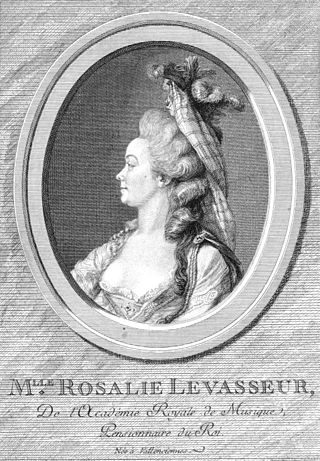
Marie-Rose-(Claude-)Josephe Levasseur, known in her day as Mademoiselle Rosalie, and later commonly referred to as Rosalie Levasseur was a French soprano who is best remembered for her work with the composer Christoph Willibald Gluck.

Gloria is a tragic opera in three acts by Francesco Cilea with an Italian libretto by Arturo Colautti. A variation on the Romeo and Juliet story and set in 14th century Siena, the libretto is based on Victorien Sardou's 1874 play La Haine (Hatred). The opera premiered on 15 April 1907 at La Scala conducted by Arturo Toscanini with Solomiya Krushelnytska in the title role. Gloria was a failure at its premiere when it was withdrawn after two performances and fared little better in the 1932 revised version, although there have been two late 20th century revivals. It proved to be Cilea's last staged opera. In the 43 years following the premiere of Gloria he worked on two or three further operas which were never performed and continued to compose chamber and orchestral music.
Henri Larrivée was a French opera singer. He was born in Lyon. His voice range was basse-taille. According to Fétis, Larrivée was working as an apprentice to a wigmaker when the head of the Paris Opéra, Rebel, noticed his talent for singing and hired him as a chorus member. He made his first solo appearance as a high priest in a 1755 revival of Rameau's Castor et Pollux. He was particularly associated with the works of Christoph Willibald Gluck, helping Gluck establish his "reform operas" in France. He found Gluck's rival, Niccolò Piccinni, less congenial but still worked with him on the premieres of operas including Roland (1778). After already getting a pension in 1779, he retired from the Académie Royale de Musique in 1786 and devoted most of the time he had left to live to tour around with his two daughters, Camille and Henriette, who played respectively harp and violin.
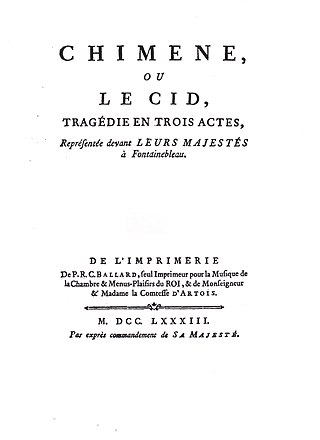
Chimène, ou Le Cid is a French-language opera by Antonio Sacchini. It takes the form of a tragédie (lyrique) in three acts, with a libretto by Nicolas-François Guillard. It was first staged at Fontainebleau on 16 November 1783. The subject of the work was inspired by the tragicomedy Le Cid by Pierre Corneille, and indirectly by the medieval Spanish epic Cantar de Mio Cid and a play by Guillén de Castro y Bellvís, Las Mocedades del Cid. Comedia Comedia primera and segunda (1605–1615).
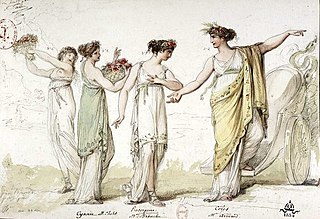
Proserpine is a French-language opera by the Italian composer Giovanni Paisiello. It takes the form of a tragédie lyrique in three acts. The libretto, by Nicolas-François Guillard, is a reworking of Philippe Quinault's Proserpine. Paisiello's opera was first performed on 28 March 1803 at the Paris Opéra.














